- FROM THE TOP
- Annual Scientific Meeting 2019 by ArcticNet
- Tales from the Field cocktail hour
- Public Speaker Series at CHARS
- POLAR’S PEOPLE
- Reel Youth group at CHARS
- LEARNING AND PERFORMANCE
- Inuinnaqtun/Inuktitut word of the week
- Inuit Research Training – A Guide for Researchers
- Discover Digital
- Are you ready to Talk the Talk?
- UPDATES
- Northern Science Award
- POLAR Events Calendar
FROM THE TOP
Annual Scientific Meeting 2019 by ArcticNet
ArticNet is a program of the Networks of Centres of Excellence of Canada (NCE), whose objective is to facilitate collaboration in the study of climate change and modernization in the coastal Canadian Arctic. Canadas North is experiencing unprecedented change in its sea and terrestrial ice, permafrost and ecosystems under the triple pressures of climate change, industrialization and modernisation.
Each year hundreds of researchers, students, Northerners, policy makers and stakeholders gather at the Annual Scientific Meeting (ASM) hosted by ArcticNet.
This year’s conference, that was held between December 2 and December 5 in Halifax, marks the 5th year of POLAR’s attendance. The staff who attended this year had a fantastic time participating in meetings and talks that ran throughout the three-day period. Over the course of the conference many of our staff had the opportunity to co-chair discussions and present their research projects. President & CEO David J. Scott also co-chaired the Canada-UK Cooperation in Action discussion.
Along with many other exhibitors, POLAR had a booth set up during the event, with a number of staff on hand to educate passersby about our programs and services. Our booth was well received by the public eager to learn more about our organization and commitment to the Arctic.
Tales from the Field cocktail hour
Brought to life by the Canadian Museum of Nature and POLAR was the “Tales from the Field” cocktail hour on December 5th, aimed to celebrate Arctic research though quick and engaging tales of memorable and impactful work experiences.
During the cocktail hour, David J. Scott and POLAR Board of Directors Chairperson Richard Boudreault presented Dr. Julie Cruikshank with the 2019 Northern Science Award. The award is presented annually to a group or an individual who has made a significant contribution to knowledge and understanding of the Canadian North. POLAR extends its congratulations to Dr. Julie Cruikshank for her exceptional documentation of the oral histories and life stories of Athapaskan and Tlingit elders, and exploring Yukon First Nations’ systems of narrative and knowledge. Her work helps Yukon First Nations recognize and honor the strengths of their cultural traditions and achieve a full understanding of their identity and place in the world.
Public Speaker Series at CHARS
An exciting public speaking event took place on November 28 at the CHARS campus, which hosted wildlife documentary filmmaker, Jane Atkins from the British Broadcasting Corporation (BBC) and research scientist, Dominique Fauteux from the Canadian Museum of Nature. Along with these two fantastic presenters, the Reel Youth group had the opportunity to present their current work as well as allowing elders to speak on climate change.
Frozen Planet II is a follow up to the original Frozen Planet series released in 2011. It is intended to be released in 2021, ten years after the release of the original series. Atkins spoke about BBC’s larger initiative to film arctic research as well as an update to the production of Frozen Planet II. Fauteux spoke about his research, focused on better understanding the workings of terrestrial ecosystems using micro-mammals. His presentation at the CHARS campus was focused on the lemming; a micro-mammal that packs a large ecological footprint in the Arctic tundra. To learn more about the lemmings, take a look at this 5-minute read published by Dominique -- Lemmings: The favourite Arctic meal.
During the Reel Youth group’s stay at the CHARS campus, they had the opportunity to film with the elders in the community and speak with researchers about the changing climate. The film created by the youth and elders in Kugluktuk was screened during the event to increase understanding of climate change on wildlife and communities.
The event was incredibly well received by the public with over 40 individuals attending! The CHARS campus was commented as “a great venue that can catalyze creativity in story telling around science subject matter to bring different groups together to interact.” – Reel Youth
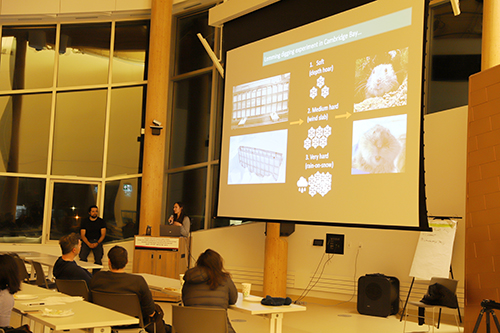 | 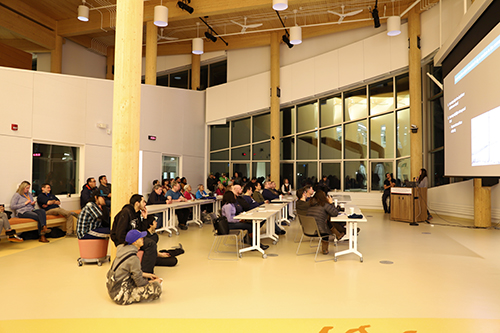 |
POLAR’S PEOPLE
Reel Youth group at CHARS
Last week, POLAR had the opportunity to host the Reel Youth Film program at the CHARS campus. The Reel Youth Film program is an inspiring group of creative minds using film production to create a positive change in young people’s lives. Through the use of technical skill building, leadership training and creative collaboration, this group is mostly comprised of youth 19 and under.
The focus of their filmmaking session at the campus last week was to share the stories of the elders’ lives, their traditional knowledge, and how they are adapting to climate change. This project in partnership with the Kitikmeot Heritage Society is intended to strengthen the inter-generational connections. During their time at the CHARS campus, the youth had the opportunity to interact directly with the elders and POLAR staff Ian Hogg and Chris Arko in one of our research labs about climate change and microscopic subjects.
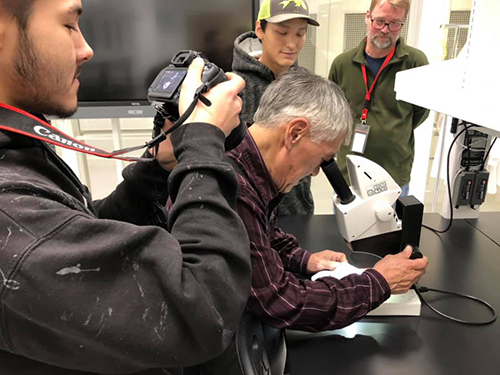 | 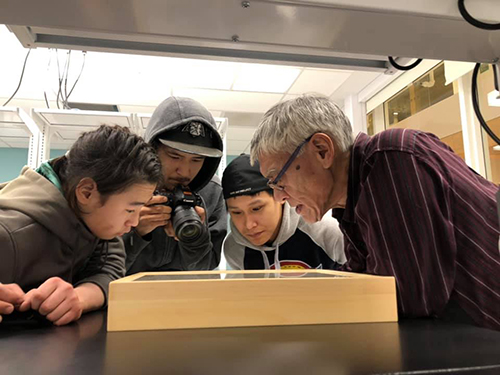 |
LEARNING AND PERFORMANCE
Inuinnaqtun/Inuktitut word of the week
The Inuinnaqtun/Inuktitut word of the week is quaq. It means “frozen meat”.
It is pronounced: qwoq
Listen to the pronunciation here.
Inuit Research Training – A Guide for Researchers
The National Inuit Strategy on Research released by Inuit Tapiriit Kanatami in 2018 identifies building research capacity within Inuit Nunangat as one of five top priorities for ensuring Inuit self-determination in research. The strategy follows the Truth and Reconciliation Commission of Canada’s call for a national research program that improves our understanding of reconciliation. This report briefly discusses some previous training approaches, and describes one research assistant training effort that blends an Inuit Qaujimajatugangit (IQ or Inuit knowledge) learning philosophy with a Western learning taxonomy to advance understanding and dialogue about Inuit and Western research and ethics. The Inuit and Western research training workshops offer a starting point to help build capacity in Inuit Nunangat research.
View the full report here.
Discover Digital
As the world around us becomes increasingly digital, public services and skillsets must follow suit. This course, offered through the CSPS Digital Academy, aims to guide learners through the impact of new and emerging digital methodologies while exploring digital standards and their relevance to the public service. Participants will learn the meaning of digital in a government context, assemble their digital toolbox and explore new approaches of creating a digitally-enabled work environment in their own organizations.
For more information on available dates and locations, check out CSPS’s upcoming offerings.
Are you ready to Talk the Talk?
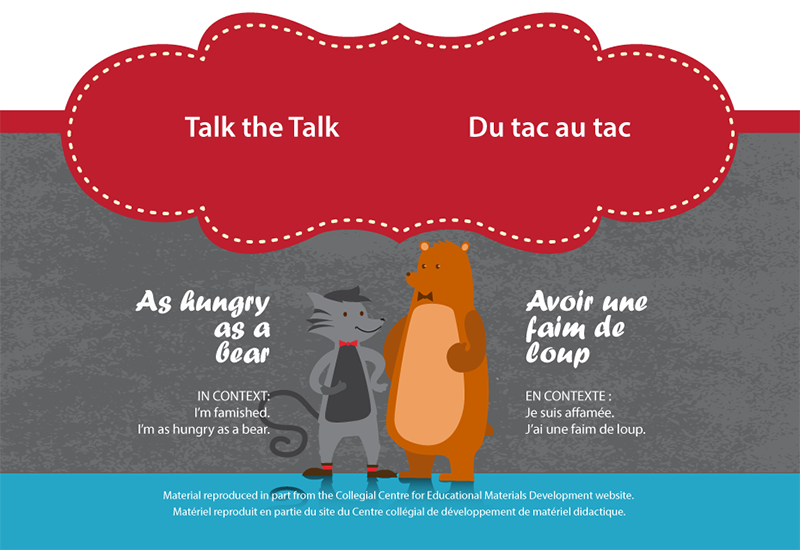
UPDATES
Northern Science Award
The Northern Science Award is presented annually to an individual or a group who has made a significant contribution to meritorious knowledge and understanding of the Canadian North. In the spirit of the last International Polar Year (2007-2008) the Northern Science Award recognizes the transformation of knowledge into action.
The Northern Science Award comprises the Centenary Medal, which was created to commemorate the 100thanniversary of the first International Polar Year, 1882-1883, along with a cash prize. The deadline for nominations is January 31st 2020.
For more information, please visit: www.canada.ca
POLAR Events Calendar
You will find below the latest version of the POLAR events calendar, including upcoming events and conferences for your information.
Note: The calendar is subject to change. Any travel has to be pre-approved by Directors (and above for international destinations).
Please send any calendar updates or additions to Jerry Kallada at jerry.kallada@polar.gc.ca
POLAR events calendar: December 5, 2019
